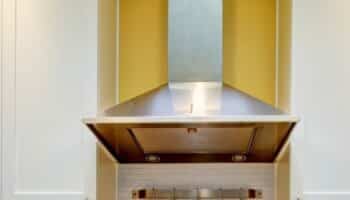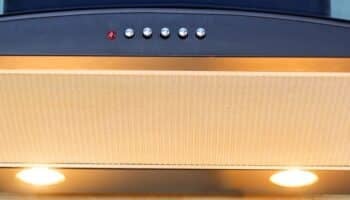Is your range hood vibrating more than a hornet’s nest, and you want it to stop?
You’re not alone! Range hoods can be of great help in the kitchen, but they can also be very loud and disrupt the peace in your home. Every day, thousands of homeowners find themselves noticing that their range hood is vibrating against the wall and have no clue how to stop it.
I understand how being in such a situation can be very frustrating – especially if you’ve already tried a couple of potential solutions to no avail. Luckily, you’ve come to the right place for answers. Below, you’ll find a list including 7 common causes of a vibrating range hood, as well as simple solutions for each one.
When your range hood is vibrating against your wall, it can be due to loose mounting, an unbalanced fan, worn-out anti-vibration pads, or worn-out motor bearings. The vibration can also come from loose ductwork, improper installation, and other appliances.
Keep reading to stop your range hood’s vibrations!
Understanding a Vibrating Range Hood
When they run, range hoods are constantly moving their internal fan to remove smoke, unwanted smells, and excess humidity from your kitchen. There are many possible reasons that can explain a range hood that’s vibrating against your wall – from something as simple as an unbalanced fan to more complex issues, such as worn-out motor bearings or loose ductwork.
To help you get to the bottom of the issue quicker, here are some elements that, in my experience, are most commonly to blame when a range hood is vibrating excessively.
#1 Loose Mounting
The first possible reason why your range hood is vibrating against your wall is that the appliance’s mounting is loose. While not true for all range hoods, some models include an additional mounting frame that helps keep them more stable over time.
When installed properly, the frame makes the range hood steady as a rock, but when installed improperly or when some of the screws/bolts come loose, the appliance can start moving more than it should.
Solution: In my experience, addressing a loose range hood mounting is as simple as tightening a few screws and bolts that might have come loose. Please check your User Manual to determine whether your range hood is supposed to have an additional mounting frame, and if so, look at it closely.
Once you’ve located where the potentially loose screws and bolts are, tighten them and see if the range hood still vibrates.
#2 An Unbalanced Fan
The next possible reason why your range hood is vibrating excessively against your wall is an unbalanced fan. As you may know, to remove excess humidity, smoke, and strong smells from your kitchen as you cook, your range hood relies on an internal fan that both pulls in air and exhausts it through its ducts.
When the fan works normally and is balanced, your range hood will deliver the expected results without moving too much. However, over the years, I’ve found that if the fan is unbalanced, it can lead to excess movement and vibrations against the wall.
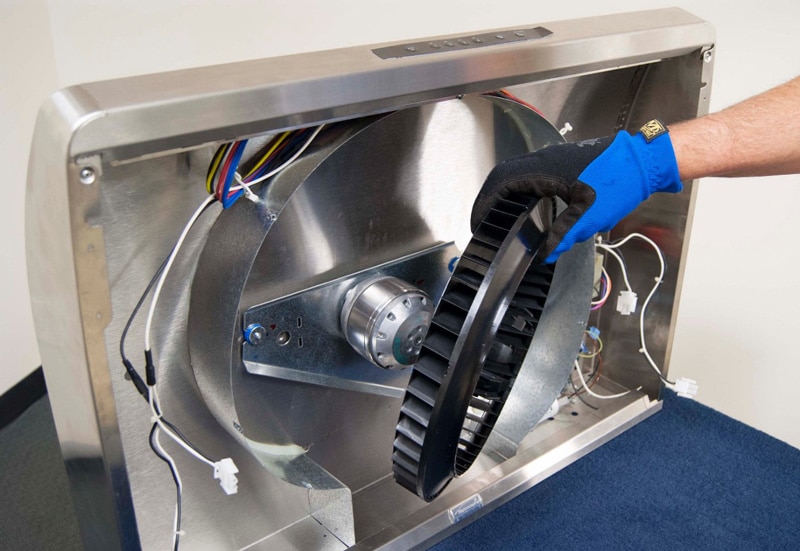
Solution: To check whether your range hood’s fan is unbalanced and balance it back to normal, you’ll need to:
- Cut power to your kitchen from your circuit breakers.
- Remove the grease filters from your range hood. Usually, you just have to press on a couple of tabs and carefully remove the filters from the appliance – it’s very simple!
- Once you’ve removed the filters, look for the screws holding the external metal panel in place and undo them.
- Remove the metal panel.
- Restore power to your kitchen via your circuit breakers and see if the fan moves erratically and out of balance. If so, cut power to your kitchen again and tighten the fan’s screws.
Provided everything looks tight, but the fan still seems unbalanced, there’s a good chance it’s damaged and needs replacing. My usual advice is to wait to replace the fan until you’ve tried all other solutions below, but if you want to do it right away, here are some simple steps you can follow:
- Cut power to your kitchen from your circuit breakers.
- Undo the screws holding the range hood to the wall and carefully remove the appliance and place it somewhere you can work on it comfortably.
- Carefully disconnect any wires going from the wall to the appliance.
- Undo the screws holding the fan in place and disconnect any remaining wires (I recommend taking a picture of the wiring layout first for reference).
- Install the new fan into place, reconnect it, and tighten its screws.
- Reinstall the range hood onto your kitchen wall.
- Restore power to your kitchen and activate the range hood to see if it has stopped vibrating.
#3 Worn-Out Anti-vibration Pads
Worn-out anti-vibration pads can also explain why your range hood is vibrating against the wall. Some range hood models come equipped with small pads that help reduce the vibration as the appliance runs.
When the pads are brand-new or in good condition, they help dampen the vibrating movements and make your range hood quieter and more stable. However, as time passes and the pads wear out, they can no longer dampen the vibrations as well, leading to excessive movement and noise.
Solution: In my experience, it’s not very common to have range hoods with vibration pads, as they’re more commonly used in washers and dryers. However, it can’t hurt to check if your range hood has them.
If you see that your range hood has anti-vibration pads, changing them for new ones is rather simple and cheap. Once the new anti-vibration pads have been installed, your range hood should be much quieter and stable.
#4 Worn-Out Motor Bearings
Worn-out motor bearings can also be to blame when your range hood is vibrating excessively against the wall. The motor inside your range hood is what helps the fan spin at the desired speed and remove excess smoke, unwanted smells, and humidity from your kitchen’s air.
When the motor works properly, and its bearings are both well-lubricated and undamaged, it can adjust the fan’s settings to your liking and deliver great results – all while remaining quiet and stable. But when the motor’s bearings are dry or worn out, excessive vibration and noise can occur.
Solution: Replacing a range hood’s motor bearings isn’t easy, and you’ll need the right skill set and tools for the job. Not to mention that the wiring layout can be a little complex, so my usual advice in such cases is to leave the job to a professional.
If you want to get a headstart on the repair, you can buy the bearing replacement before the technician arrives by using the part model number on your User Manual. If you don’t have the manual handy anymore, please refer to our free resource below.
Buying the replacements early can be advantageous, but it can also put you in a position to buy something you don’t need. Sometimes, the bearings are okay and need lubrication to stop vibrating, so if you want to be 100% sure, wait for the technician’s diagnosis and then buy the replacement parts if needed.
#5 Loose Ductwork
From what I’ve seen over the years, loose ductwork is also a common culprit when a range hood is vibrating against a kitchen wall.
When your range hood is installed, the professional responsible has to deal with several wires and ensure the ductwork is done adequately to prevent air leaks and guarantee that the appliance can exhaust the air it pulls in.
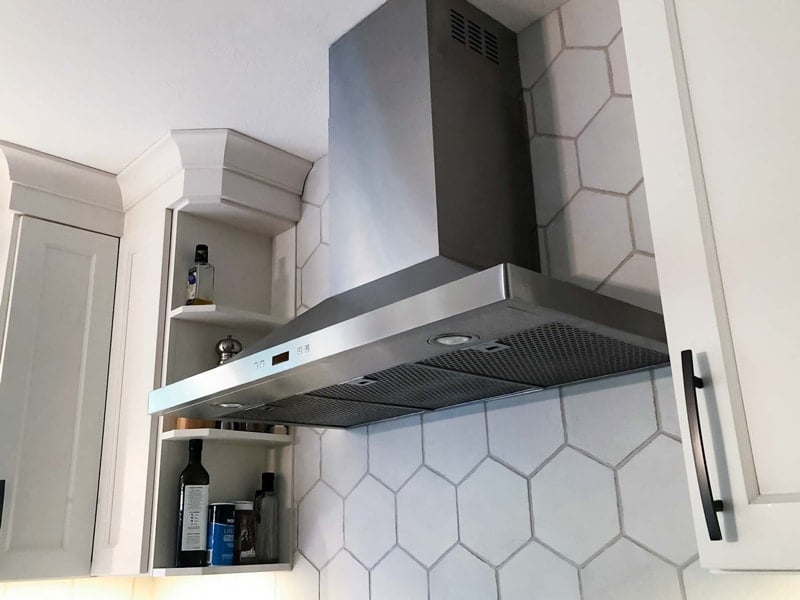
Given that there’s a lot to work on to install a range hood from start to finish, it’s always possible that there’s something loose along the ducts and vents that have been installed, causing the vibration you’re hearing.
Solution: The best way to tell whether the vibration comes from loose ductwork is by inspecting it closely. Cut off power to your kitchen via your circuit breakers and take some time to examine the vents and ducts to try to spot loose screws, bolts, or panels along the way.
If you do spot anything loose, tighten it. Ensuring your range hood’s ductwork is hermetic and tight can not only help reduce or eliminate the vibrating noise altogether but also improve airflow and the removal of unwanted smoke, lingering smells, and excess humidity.
#6 Improper Installation
Improper installation can also be to blame when your range hood is vibrating against the wall. Range hoods, as simple as they may look, are actually quite complex in that they need to be installed flawlessly to prevent air leaks and excess noise.
If your range hood is not anchored properly to the wall or there are loose components/panels/ducts, it will vibrate as the fan spins, and it can also overheat and cause a wide range of issues.
Solution: Depending on how much time has passed since you had your range hood installed, I’d recommend different things.
If the range hood was not installed too long ago (less than 1 year), my usual advice is to contact the contractor that installed it and tell them about the appliance’s behavior. Many contractors will offer a 1-year labor warranty, so they might be willing to return to your house and redo any part of the job that needs redoing to get it right.
That said, if your range hood has been installed for a while and is just now giving you problems and vibrating against the wall, improper installation is unlikely the culprit.
#7 Vibration From Other Appliances
The last possible reason why your range hood is vibrating against the wall isn’t even related to the range hood itself!
Sometimes, the vibration can come from other appliances that are also installed or resting on the same wall as the range hood. Other appliances can trick you into thinking the range hood is to blame for all the noise when, in reality, it’s not.
One of the simplest ways to tell whether your range hood is causing the vibration is to observe the appliance while it’s off. If you notice vibration still happening while the range hood isn’t running, you can safely rule it out as the source.
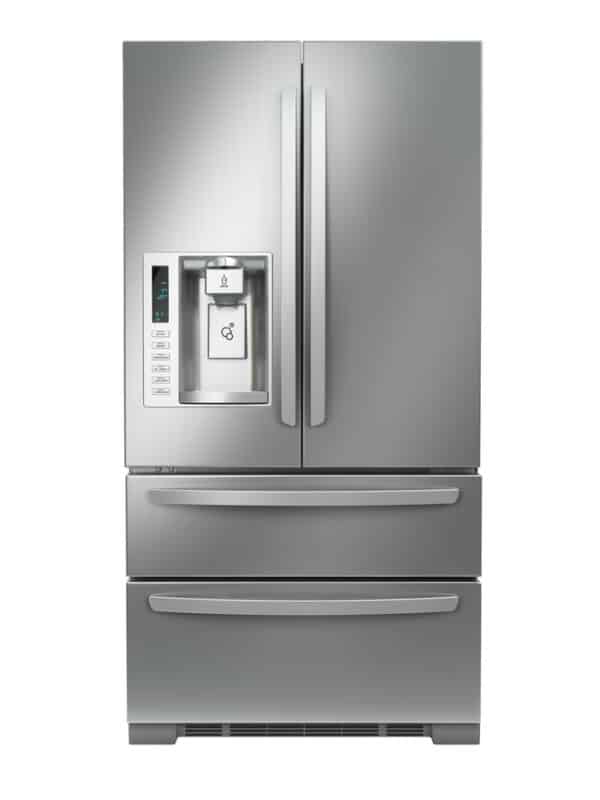
Solution: Not much to do here, as there isn’t really an issue with your range hood. You can try moving the appliance responsible of the vibration a couple of inches away from the wall to see if it improves the situation.
Alternatively, you can get the anti-vibration pads mentioned earlier to dampen the noise – they work wonders and aren’t awfully expensive!
Eliminating Your Range Hood’s Vibrations
That about covers it!
When your range hood is vibrating against the wall, it can disrupt the peace and quiet of your home and make you worried over the potential cost of quieting it down.
Luckily, as I hope this piece has helped you better understand, addressing the most common causes behind a range hood that’s vibrating against your kitchen wall can be easy, quick, and cheap. More often than not, something simple, like tightening loose bolts/screws and ensuring the fan inside the appliance is balanced, will do the trick.
Thanks for reading. If this article was useful and answered your most burning questions, please check out our other resources and free guides below and consider subscribing to our newsletter.
Have a wonderful week!
-Craig.







